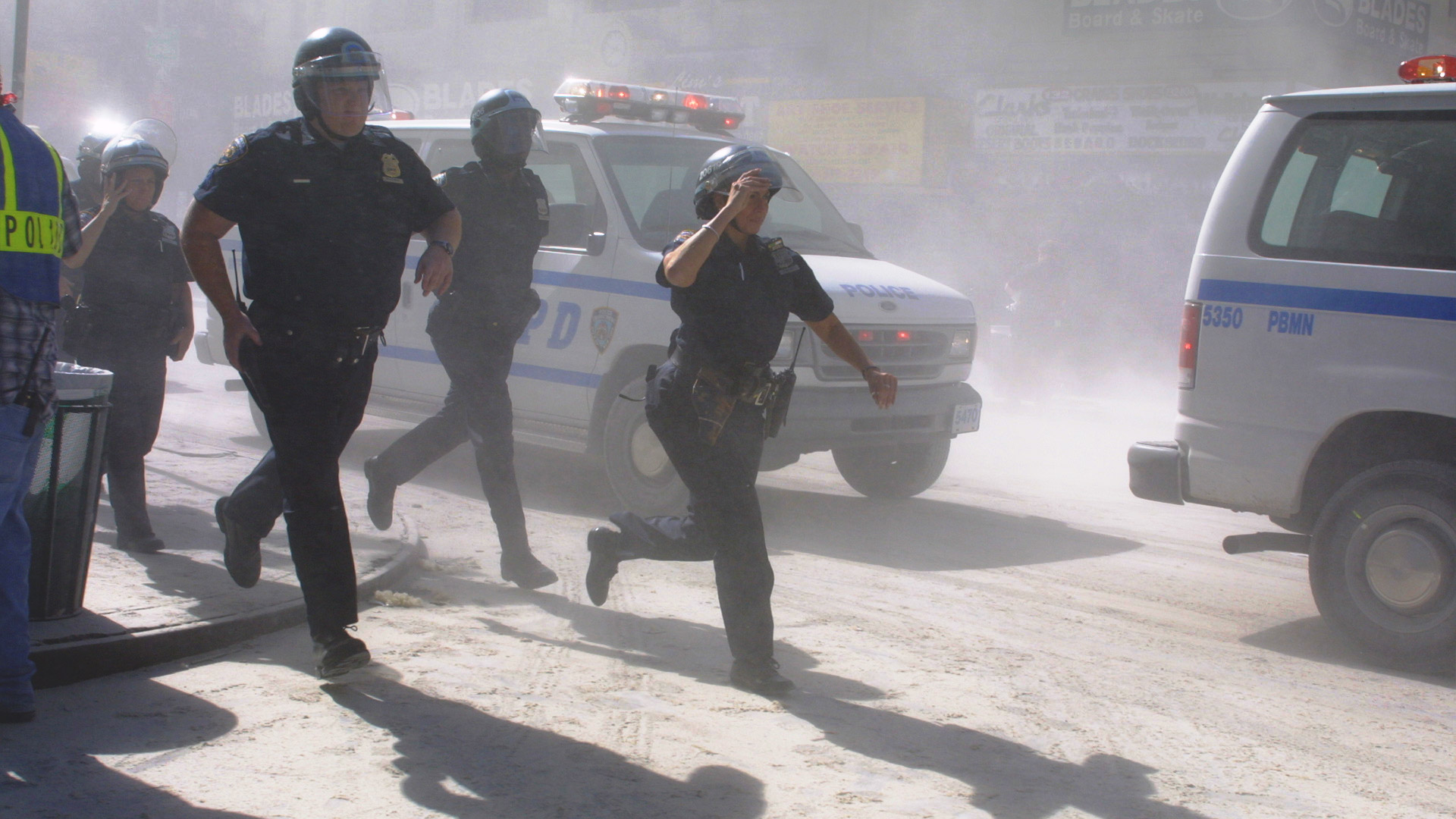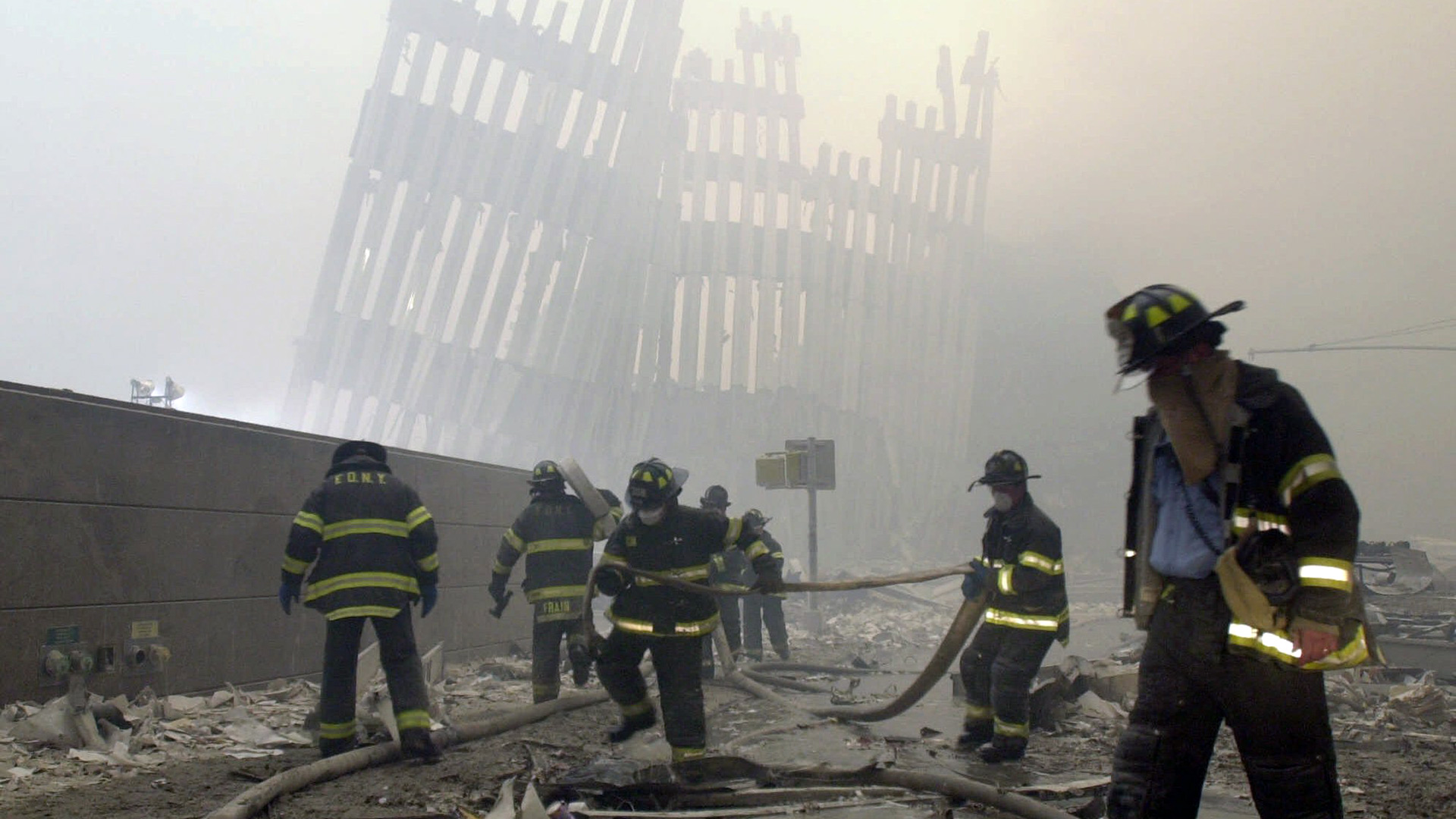
The young police officer sat in front of me on a police bus as it made its way to the World Trade Center. I did not know her, never met her; she was not from my command. The condition of her uniform and her not-yet-battle-scarred leather duty belt told me she was not on the job long. Like all of us, her face showed concern, but unlike the others, she stayed quiet. A true rookie. I told her, “Don’t worry, we were all at the ’93 bombing of the Trade Center, stay with us, everything will be OK.” Those words came to haunt me — nothing was OK.
I was working bike patrol that morning. Radio traffic about a plane crashing into the World Trade Center sent me back to the station house, a location with a clear, line-of-sight view of the World Trade Center. I saw a huge fireball engulf one of the towers. My command was mobilizing, sending all to lower Manhattan.
It was a tense, hectic drive on the Belt Parkway to the Brooklyn–Battery Tunnel, our entrance to lower Manhattan. Just before entering the tunnel, the twin towers looming high over the Manhattan side, we saw an unforgettable sight: the collapse of the south tower. We were stunned. A sergeant said, “We just lost a lot of people.” Something I could not comprehend.
Halfway through we were met with a thick cloud of dust and debris stopping us in our tracks. Suddenly, many people emerged from the cloud. A surreal sight. My first thought was that they had abandoned their vehicles — but no, they were escaping Manhattan. The tunnel was their only route.
During the first weeks after the attack, cops were not talking; we were all still processing what we went through.
They could not see or breathe; they were coughing, choking, just trying to survive. We donned Scott Air-Paks and began the evacuation to Brooklyn. My training taught me not to share breathing apparatus when making rescues, but people needed to breathe! I put my mask on many to help them with their unthinkable journey. One man told me he was from Israel; he was much calmer than others, this was probably nothing new to him.
It took us about 40 minutes to evacuate all except one man who appeared to be suffering from a heart attack. A squad of New York City firefighters who were walking through the tunnel from Brooklyn joined us. All but one of our cops, a registered nurse, got on the bus. He stayed behind and focused on trying to save the man’s life.
Just before we exited the tunnel, the second tower came down. We entered a world devoid of color, as if a dense fog descended, obscuring all. The sight of a traffic cop still on his post, a bizarre juxtaposition of official duty and the disbelief of that officer’s reality, is one of my few memories after we left the tunnel. The air was contaminated by millions of pieces of paper and vaporized building materials. We soon realized we were inhaling particles of incinerated human beings. Nothing was in the realm of reality that day; we were dealing in a reality we never could have imagined.
We made our way to a still-standing pedestrian bridge, halted by what was to become known as “the pile,” the remains of the twin towers. The squad of cops on the bus split up; half repositioned to a different location and the cops I was with remained, set up a command post and began working with firefighters.
I do not have much recall of the seven to eight hours on scene. As it was explained to me by a psychologist, the brain is an amazing organ that sometimes protects a person from painful memories. I do have some recollection of specific observations; other occurrences were gathered from cops who supplied the missing pieces.
I remember a young woman walking toward us through the cloud on West Street pushing a stroller with a baby in it. She was covered in ash and in obvious shock. I approached her. Looking in her eyes, I could see she was not aware of her surroundings. I gently turned her and the stroller around, her mind a fog within a fog, and watched her walk away. Normally I would have requested EMS, but that was not a possibility that day; we had no communications.
I remember working with a firefighter at the base of the pile. He said, “We probably lost a battalion in there.” I asked how many are in a battalion, and he replied, “250 to 300.” The New York City Fire Department lost 343 firefighters.
Among the debris surrounding us on West Street was an aircraft’s landing gear. Across from that site was a construction area between the northbound and southbound lanes of West Street. It was cordoned off by a construction fence. For some reason, when I was walking along the fence line, a man on the other side started yelling, “Officer, officer!” He was holding a metal object as I turned toward him. He said, “Officer, this is part of the plane.” I told him to put it down. He kept insisting it was a piece of one of the planes, and kept saying, “Officer, officer, take it, it’s evidence.” He would not stop, causing me to finally yell, “Put the f—— thing down and get the hell out of there!”
That’s it, that’s all I really remember about my time in that hellish nightmare. Everything else we were doing was told to me weeks later as cops started to talk among themselves. During the first weeks after the attack, cops were not talking; we were all still processing what we went through.
One day, a young cop pulled his radio car up to mine and asked me, “Is it alright to be scared?” As a union representative, I knew I had to answer the question honestly. I said, “Hell yeah, I’ve never been more scared.” It was then I realized that the cops had to start talking among themselves about what happened to them. We were in the beginning of working 12-hour days with no time off, dealing with the losses we suffered and no family time. This was to continue for close to two years.
Once I told the young cop that I was scared, I felt relief. With the cops starting to talk, I made it a point to say how petrified I was at the Trade Center. Admitting that was good for me and I hoped it could help others.

Speaking among ourselves allowed me to fill in my memory blanks. One day as a few of us were talking, I mentioned the sight of the landing gear. A detective sergeant mentioned body parts surrounding the gear. I said I did not remember that at all. “You couldn’t get near it without wading through body parts,” he replied. That puzzled me and left me to wonder if we were talking about different landing gear, I mean, there were two airplanes. Sometime later, I was talking to a cop who was with me that day and related the landing gear story to him. I asked him if he saw any body parts. His look was that of disbelief. He replied, “There were body parts all over. Don’t you remember the arm sticking out of that fence? You were up and down that fence all day.” It was after that I started to put together a timeline of events, realizing what my brain was not allowing me to remember.
My mind block apparently ends as we made our way to my department’s command post set up north of the Trade Center in the gymnasium of Manhattan Community College. It was about 5 p.m. when we entered the gym. The vast command post had makeshift triage areas, stockpiles of supplies and cops with dazed looks, torn uniforms and burned skin. Walking into the gym, we were met with stares of disbelief, as if we were ghosts. We may have looked like ghosts, each of us covered head to toe in ash, but we were real, live humans. We were told our names were on the list of the missing.
A new reality set in as we learned about our sister and brother cops who were killed. I was on the job about 16 years that day and always felt lucky that during that time my department had not lost a single cop. We had a few officers shot and many more injured, but all survived, and then on a single day within a few moments, 37 of my sister and brother cops were killed. A sobering fact I will never, ever want to forget. The 37 Port Authority cops killed that day is the single, largest loss of police officers in a single incident in the history of American law enforcement. Adding to the PAPD 37, the New York City Police Department suffered 23 fatalities with New York State court officers, New York State taxation investigators and four federal agents, 72 law enforcement officers were killed in the line of duty at the World Trade Center on September 11, 2001.
My psychologist told me 9/11 will never leave me, will always be a part of me and that I must accept it.
Exhausted and within a few minutes of lying on a bleacher, people began running out of the gym. I was told World Trade Center 7 was coming down. I did not move; I did not want to see another building collapse.
The cops I was with and myself were seasoned police officers, each with years of experience in difficult and challenging situations. Even the 1993 bombing of the World Trade Center did not prepare us for what we faced that horrible day. My sisters and brothers performed selflessly and heroically, but we know the officers who climbed the stairs of those towers, helping others to escape while knowing their survival was uncertain, are our and God’s heroes.
The aftermath was long and difficult, and in many ways continues. There were times when seeing an airliner caused me to desperately want to reach out and remove the plane from the sky so that it could not hurt anyone.
My brain still tries to understand what happened. During a session with the psychologist, I told her I did not understand those who, through their very public actions and utterances, seem to claim ownership of that day. I told her I did not want to stay with 9/11; I wanted to move as far from it as I could. She told me it will never leave me, will always be a part of me and that I must accept it. Those words, for me, were the only good I received from the events of September 11, 2001 — the gift of acceptance.
I did not see the young officer I spoke with on the bus for almost nine months. My words to her still bothered me. On May 30, 2002, at the World Trade Center Rescue and Recovery closing ceremony, I saw her and hugged her, thanking the Lord she was well. I confessed how sorry I was that I told her everything would be OK. We hugged again with her telling me not to worry and that everything is OK now.
Talking with her brought me relief and comfort, something I thought would never happen after experiencing the horror of the overwhelming loss of humanity. I needed to know how long she had been on the job on September 11, 2001. She looked at me with a look of a battle-scarred veteran and said, “I was out of the academy three months.”
As seen in the September 2022 issue of American Police Beat magazine.
Don’t miss out on another issue today! Click below:





